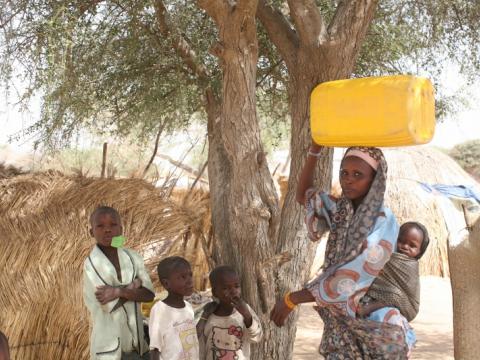The precious source, improve little Aicha's health

Water is life, and for many it represents good health, that’s why World Vision believes that “Every child deserves clean water”.
Unsafe water and poor sanitation are linked to transmission of diseases such as cholera, diarrhoea, hepatitis A, typhoid and polio. Inadequate water and sanitation services expose individuals, in particular children to preventable health risks. The risk of exposure is high in conflict or crisis contexts. Displaced children and women are placed at additional risk of infection and disease when water, sanitation and hygiene services are lacking. This was the case for Aichatou’s daughter, little Aicha, before World Vision constructed a borehole in the Maine Kaderi settlement of Internally Displaced People, where she lives.
Aichatou Malam Mane, (30) mother of seven children (five boys and two girls), who was forced to flee Gaidam Tchuku village (30km from Diffa), due to Boko Haram attacks in Damasak, shared her relief of having safe water in the settlement. “Life was very difficult in settlement when we arrived, because my children and I used to fall ill with diarrhea and malaria all the time, particularly my little Aicha (1). I used to walk three kilometers to Gagamari village to fetch water three times a day and it’s wasn’t free, I had to pay $ 0.5 USD for 25 liters. Although I knew that the water wasn’t safe, I had no choice, because there was no other way to get water”, says Aichatou holding a 25 liters plastic water container
Aichatou has been living in the settlement for the past eight months with her family, and the hope to return to her normal life in Gaidam Tchuku soon. “My village is near a river and if you stand by its shore, you can see the town of Damasak. On the days of the attacks, you could see bullets and rockets flying towards our village from Damasak. After several attacks, our village became, a very insecure place, so my husband decided that we should leave”, Aichatou recalls.
“Back home I used to sell, ‘beigne’(local donut made of flour), every morning in front of my house, this activity gave me a profit of US $2.6 a day. My husband had a big land where, he farmed pepper which he would then sell at the local market. We were not rich, but our economic activities brought in enough to make ends meet”, adds Aichatou, tightly holding Aicha.
Aichatou’s family of nine used to pay for 75 liters of water per day. Which corresponds to eight liters of drinking water per family member. But in reality the water paid, was used for all the basic needs of the family including drinking. This quantity is way below the Sphere Standard for basic water needs in emergencies, (7. 5 to 15 liters of drinking water per person per day). “After doing six kilometers, I used to feel very tired and yet I had to cook, do the washing up, clear the tent, and with the remaining water wash the children and drink. In the past, Aicha only bathed once in two days”, Aichatou says with a tinge of regret
According to Aichatou, the lack of safe water had serious consequences for her children’s health, but the arrival of World Vision reversed the situation. World Vision drilled a borehole, built 70 emergency latrines and set up two committees, one for water management and the other for hygiene in the settlement. These actions have benefitted 570 internally displaced families.
Since November 2016, Aichatou’s family, has 150 liters of free water, per day (16 liters per family member) and she has free time on her hands to look after little Aicha. ”Today I have time, to fetch water, cook, clean the house, and wash the children and to rest. My baby’s health has improved, I don’t have to go with her to the Health Center at Chetimari (three kilometers from Aichatou’s settlement) anymore”.
Aicha is among the 1.4 million vulnerable children in the forgotten Lake Chad Basin crisis, in need of safe water for drinking and personal hygiene. World Vision calls on donors and humanitarian actors to remember that Aicha, and all children in the Lake Chad Basin, have the fundamental right to water. You have the power to prevent children like little Aicha, from falling ill due to consuming unsafe water. The global community must urgently prioritise funding, coordination and implementation of programmes that aim to enhance sustainable access to water points and sanitation amenities, and scale up hygiene education to avert disease outbreaks and deepening malnutrition.
Do right for these children, and do it now.